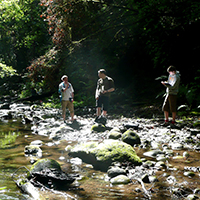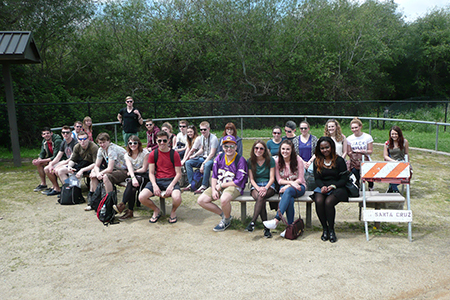 Geography’s Santa Cruz field class of 2014
Geography’s Santa Cruz field class of 2014
This year marks the 20th Santa Cruz field class. Since 1995, final year Geography students from the University of Liverpool have spent two weeks in California studying the physical and human geography surrounding Santa Cruz, California.
The field class (along with others currently running to Barcelona and Singapore) is the capstone of the BA and BSc Geography degrees, allowing students to put into action the research skills that they have developed over the previous three years of study. Fieldwork is a vital part of Geography, allowing students to experience first hand differences in physical, climatic, political, social and cultural environments.
The development of students’ knowledge, understanding and skills through fieldwork, in approaching and evaluating difference, and considering the extent to which contrasting approaches might be transferred across different physical and social boundaries, is unrivalled by any other teaching method.
Student, Susy Collins said: “Field classes give you the opportunity to develop the skills you have learned during the rest of your course but whilst exploring a new environment and culture.”
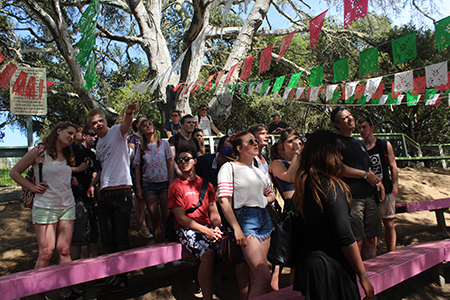 The students visit a Catholic shrine on the second Bay tour
The students visit a Catholic shrine on the second Bay tour
Throughout the second semester of their final year, students attend a lecture series which introduces them to the physical and human geography of the area, and they work in small groups (typically 3 or 4 students) to research a topic of their choice, refine research questions and develop a methodology.
At the end of the semester they then spend two weeks in the field carrying out their research. This year, projects are being carried out on public perceptions of drought; lake water quality and agricultural runoff; issues relating to drought and wetland management; attitudes to genetically modified foods; the effect of large woody debris dams on stream flow and estimating carbon capture in coastal redwood forests as well as sediment tracing within river catchments.
Student, Olivia Achurch said: “We’ve developed skills such as time management, team-work, and field techniques that you simply cannot learn in a lecture theatre.”
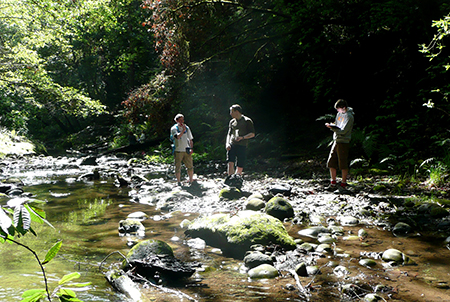 Out in the field: students research sediment tracing within river catchments
Out in the field: students research sediment tracing within river catchments
In addition to their own research, students also go on two day tours allowing them to situate their own projects in relation to broader historical, environmental and cultural contexts.
Throughout their field work, students keep a detailed field notebook which is assessed on a daily basis allowing them to get instant feedback that can be incorporated into the next day’s research plan. This model means that students leave the trip with finely honed skills in managing a research project, working as a team, and dealing with challenges as they arise.
At the end of the trip, students submit a research report produced to strict formatting guidelines, giving them important experience of developing a professional document. For many projects, these reports are returned to organisations within Santa Cruz to disseminate research results locally.
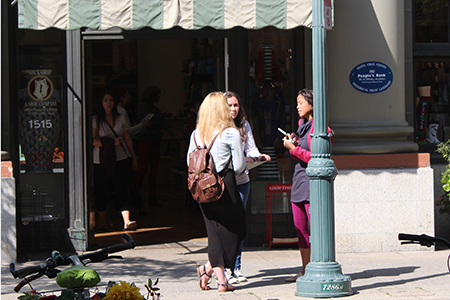 Students from a group researching drought talk to a local newspaper reporter about their work. Drought is a big concern in California so this group’s research is highly topical
Students from a group researching drought talk to a local newspaper reporter about their work. Drought is a big concern in California so this group’s research is highly topical
After 20 years of the trip, staff and students have built a substantial knowledge base about the geography of Santa Cruz, yet Santa Cruz is a dynamic place in terms of physical, political and cultural landscapes, and even after 20 years there remains much to explore.
Student, Kate Hollis said: “Learning in the field is such a valuable and worthwhile experience and has been a fantastic end to my degree.”
The people of Santa Cruz are incredibly welcoming of Liverpool Geography Students, who never have any problems getting people to talk to them, and often students combine their field work with some voluntary work with local non-profit organisations. For many students this trip is the highlight of their Geography degree.
To learn more about studying at University of Liverpool, visit our Study pages
